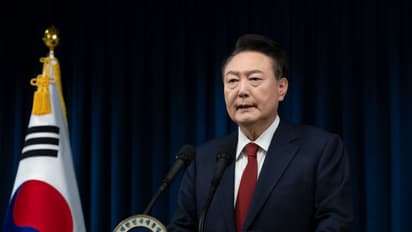Cheers erupt as South Korean President impeached: What's next for Yoon Suk Yeol explained (WATCH)

Synopsis
South Korea’s National Assembly members have voted to impeach president Yoon Suk Yeol over his attempt to impose martial law.
South Korea's parliament voted on Saturday to impeach President Yoon Suk Yeol, following investigations into allegations of rebellion linked to his controversial martial law decree issued on December 3, which has sparked significant political unrest. The National Assembly approved the motion with a vote of 204-85.
As a result, Yoon’s presidential powers will be suspended once the impeachment document is delivered to him and the Constitutional Court. The court has up to 180 days to decide whether to uphold the impeachment or restore his powers. If Yoon is removed from office, a national election will be held within 60 days to elect a new president.
The announcement of the vote results was met with cheers from members of the Democratic Party, while lawmakers from the ruling party left the chamber in silence. Some were even seen clasping their hands in prayer as the vote count unfolded.
WATCH: South Koreans celebrate Yeol's impeachment
This was the second time the National Assembly voted on President Yoon Suk Yeol's impeachment motion. The first vote, held last Saturday, saw Yoon survive after most lawmakers from the ruling party boycotted the session. However, following growing public protests and a sharp decline in Yoon's approval ratings, several members of the People Power Party announced they would support his impeachment in the second vote.
For the past two weeks, tens of thousands of people have gathered nightly in Seoul, braving freezing temperatures to demand Yoon’s resignation and arrest. Protesters chanted slogans, sang, danced, and waved K-pop light sticks. Smaller groups of Yoon's conservative supporters, numbering in the thousands, have also rallied in Seoul, condemning efforts to impeach the president. Both sides have held largely peaceful demonstrations.
Yoon's martial law declaration, the first of its kind in South Korea in over 40 years, lasted only six hours but triggered significant political upheaval, halted diplomatic activities, and shook financial markets. He was forced to rescind the decree after parliament unanimously voted to overturn it.
Following the martial law declaration, Yoon sent hundreds of troops and police officers to parliament to try to block the vote on the decree, but the forces withdrew after the motion was rejected. No major violence occurred.
Opposition parties and many legal experts accuse Yoon of rebellion, pointing to a legal clause that classifies as rebellion any attempt to undermine the constitution by inciting a riot against state authorities. They also argue that under South Korean law, a president may only declare martial law during wartime or similar emergencies and does not have the authority to suspend parliamentary proceedings, even under martial law.
The impeachment motion alleged that Yoon “committed rebellion that hurts peace on the Republic of Korea by staging a series of riots.”
It was argued that Yoon’s mobilization of military and police forces posed a threat to both the National Assembly and the public, with his martial law decree seen as an attempt to undermine the Constitution.
In a defiant speech on Thursday, Yoon denied the rebellion accusations, framing his martial law order as a legitimate act of governance. The conservative president claimed the decree was intended to send a warning to the main liberal opposition, the Democratic Party, which he labeled a "monster" and "anti-state forces." Yoon accused the party of using its legislative power to impeach top officials and obstruct the government’s budget proposal for the coming year.
"I will fight to the end to prevent the forces and criminal groups responsible for paralyzing the government and disrupting the nation’s constitutional order from endangering the future of the Republic of Korea," Yoon declared.
In response, Democratic Party leader Lee Jae-myung condemned Yoon’s speech as a “mad declaration of war” against the Korean people.
The Democratic Party, along with five other opposition parties, controls 192 of the 300 seats in the unicameral parliament. However, they were eight seats short of the two-thirds majority required to pass the impeachment motion and needed support from ruling party lawmakers to succeed.
Yoon has been prohibited from leaving South Korea as law enforcement investigates whether he and others involved in the martial law declaration committed rebellion, abuse of power, and other crimes. If convicted of leading a rebellion, Yoon could face the death penalty or life imprisonment.
While Yoon enjoys presidential immunity from criminal prosecution, this does not protect him from charges of rebellion or treason. As a result, Yoon could be investigated, detained, arrested, or indicted in connection with the martial law decree. However, many observers doubt that authorities will attempt to detain him forcibly due to the potential conflict with his presidential security service.
Yoon’s defense minister, police chief, and the head of Seoul’s metropolitan police have already been arrested in connection with the martial law case. Additionally, other senior military and government officials are under investigation.
Check the Breaking News Today and Latest News from across India and around the world. Stay updated with the latest World News and global developments from politics to economy and current affairs. Get in-depth coverage of China News, Europe News, Pakistan News, and South Asia News, along with top headlines from the UK and US. Follow expert analysis, international trends, and breaking updates from around the globe. Download the Asianet News Official App from the Android Play Store and iPhone App Store for accurate and timely news updates anytime, anywhere.